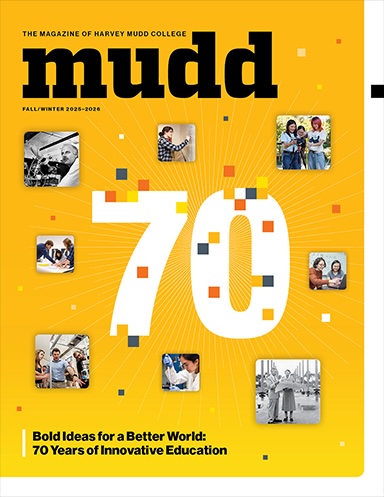Teaching Applied Mathematics to Future Engineers
September 11, 2025
For engineering students, the Applied Mathematics for Engineering (E72) course is about more than solving math equations, it’s about sense-making, according to mathematics professor and Core Curriculum Director Darryl Yong ’96 and Lori Bassman, Jude and Eileen Laspa Professor of Engineering.
E72 evolved alongside updates to the College’s Core Curriculum. The semester-long course, previously half a semester, was redesigned to tailor specifically to engineers and support their learning of mathematical engineering. Required for engineering majors, E72 provides students with new mathematical tools and guides them on how to apply the tools to solve complex real-world engineering problems. Through mentoring, students are connected with peers who completed the course and are provided guidance with coding and other E72 concepts.
Yong and Bassman designed and co-teach E72 in a strategic format that helps students build off past curriculum to support in-class learning. A key goal is to help students understand and apply engineering concepts in real-world scenarios.
“Being able to calculate things is just one part of mathematical proficiency,” said Yong. “We want students to interpret their findings in light of the application area or context for the problem.”
Engineering major Sebastian Heredia ’27 found E72 to be engaging, with tailor-made opportunities to tackle complex problems, collaborate with peers and more.
“Each week we were assigned concepts we learned in previous classes,” Heredia said. “This was super helpful in bridging the gap between old material and new applications, which built my confidence and intuition and made me feel like I was capable of problem solving. Nearly every day in E72 was an engaging work session. These activities gave me the opportunity to work with new peers and practice listening and vocalizing my reasoning.”
One of the goals of the course is to increase students’ confidence in their math skills.
“Students often have ‘aha!’ moments during finals,” said Yong. “When students reach the end of that single large problem they’re working toward, we can often see a great deal of satisfaction in knowing that they tackled something complicated and were successful. It is fun to watch their growing sense of confidence in their own mathematical abilities.”
E72 is taught in a “studio” format, allowing students to actively confront engineering problems during class, resulting in a hands-on, immersive experience. The learn-by-doing approach includes individual weekly homework assignments that students complete outside of class, but review collaboratively in-class with students and instructors for a holistic assessment of their findings.
“Daryl and I developed this class to really help students use all of the Core math that they had learned to solve complex engineering problems,” said Bassman. “We were inspired by thinking about it like a studio math class, where people were working on hard problems in class—complex problems that didn’t have simple textbook answers.”
One strategy that Yong and Bassman use to help students excel in the course is the just-in-time learning approach, which involves teaching students the skills and knowledge needed for a task after they have struggled with it. This strategy allows students to understand how to select the appropriate problem-solving method and encourages active learning, independence and confidence in students’ mathematical skills.
“As the course progresses, we try to give students more and more freedom to make their own decisions about the appropriateness of various mathematical tools so that they can grapple with these issues themselves,” said Yong.
“One of my best ‘woah’ moments actually happened when my friend and I
helped another friend think through a MATLAB problem,” said Heredia. “He and I were discussing, and I caught myself saying things that were so logically sound and in perfect math vocabulary that I couldn’t believe the words were coming out of my own mouth. At this moment, I realized that I had actually learned E72 pretty well.”
Using Real Tools to Solve Real Problems
E72 introduces students to a wide range of mathematical curriculum, from Fourier Series and transforms to systems of nonlinear equations and integer linear programming. The subjects learned can be applied to real-life engineering scenarios students encounter outside the classroom.
Mathematical tools, such as the Laplace transform, dimensional analysis, Matlab and Mathematica software, are central components of the course that allow high-level computations. Helping students learn how and when to use such tools and methods is a priority for Yong and Bassman.
Compelling real-world problems challenge E72 students. They’ve been asked to find the finite difference of heat conduction for under-floor heating, or to describe the mathematical engineering behind electric vehicle charging stations and blood pressure regulating equipment. They analyze bird flight, road grade planning and zipline designs.
Because engineering problems vary, Yong and Bassman discuss the limitations and requirements of each mathematical tool so students understand which tools are appropriate for the task.
“To solve a problem, we must clearly define its decision variables, objective function and constraints,” said Yong. “We learn how to solve complex mathematical problems by breaking them up into pieces.”
In addition to E72, engineering students are required to take Experimental Engineering (E80), which boosts understanding of E72 concepts.
“Students complete E72 and E80 simultaneously, which really gives them confidence in their hands-on experimental skills,” said Bassman. “This parallel, challenging class really elevates their ability to use analytical and computational skills.”
Heredia says that he’lll continue applying what he’s learned from E72 throughout his educational career and beyond. “Collaboration, gratitude, and grit are my biggest takeaways from this class,” he said.
Steady-State problem with Brock Bownds ‘27.
Matlab-themed cupcakes made by Professor Bassman on the last day of E72.
A slider activity for building intuition with Planar, Unforced, LTI Systems.
